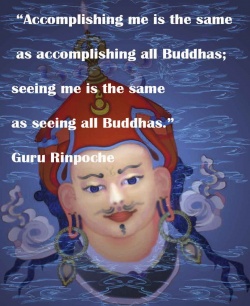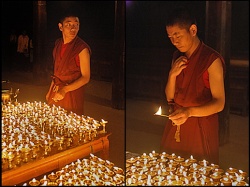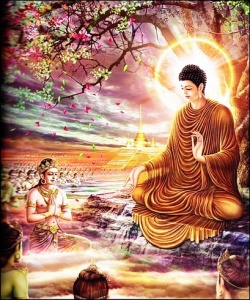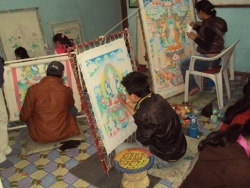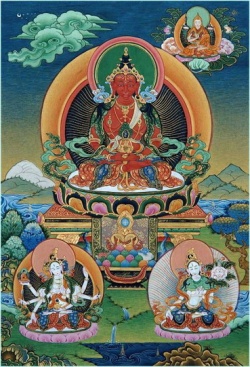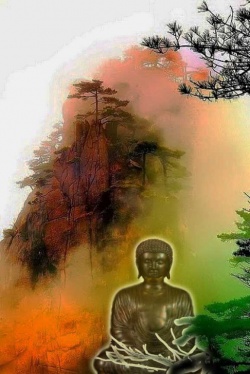The Nine Cycles Meditation
A meditation to heal lhung (wind) problems by amji Tabke
The use of this meditation
The Nine Cycles meditation is useful to expel all inner negative winds and to inhale those positive winds necessary to our well-being. It is very useful as a healing practice, to fight stress, nervousness, tension and so on. It is also useful as a preliminary practice in meditation.
The right position
The first thing you have to learn is the right position during the meditation: the traditional posture is with the legs in the Vajra posture (you can see this posture in the Buddha statues).
This posture is very difficult, so, if it is too much for you, or it is too uncomfortable or painful, you can just sit in the most relaxed position.
One very important thing: the spine must be straight as an arrow (and, at the same time, relaxed). Both hands should touch, the thumbs raised, touching each other and forming a triangle; the right palm under the left: this is called the meditation mudra.
The eyes gaze in the direction of the tip of the nose and are half closed, neither too open nor too closed. I have seen many people meditating with eyes closed; this is wrong.
The lips are in a normal position and the
mouth is relaxed, neither open nor closed.
The chin is slightly pressed inwards.
Shoulders are open and level; such as "vulture wings".
This is called the Vairochana Buddha posture: we should maintain this posture before starting a meditation. Remeber, the most important thing is that you must feel very relaxed.
During the meditation we should try to keep the mind at rest; do not let it wander. (If we are doing a Tantric meditation, at this point, we generate ourselves as the deity).
Then we visualise our body completely empty, without internal organs. Inside there are only three channels.
They run in the middle of the body, slightly in front of the spine (although there is no spine). The central channel is hollow, like bamboo; it starts in the middle of the eyebrows, goes to the top of the head , curves down (it looks like an umbrella handle) and ends at the level of the genitals. The right channel is red and the left one is white. If we talk from the point of view of Tibetan Medicine, the right channel is the blood channel, while the left is the wind channel. The two side channels are thinner. All three channels are hollow. Ideally, you could look trough them and see the end.
Expelling the negative winds
Inside the channels are the negative winds that disturb our meditation. They must be expelled. This is very important. How can we expel them?
First, raise the ring finger and close the left nostril. Inhale into the right nostril while thinking that the air coming inside has the nature of all the Buddhas, and that it is carrying all the positive energy of the Buddhas of the ten directions, of the Merit Field or of the Gurus. Before the meditation you have to visualise yourself surrounded by all those beings.
Then, when you inhale, you can visualise the breath as luminous and full of healing energy. The two side channels are a little bit longer than the central one and are joined together. When we inhale, the white light flows down the right channel, goes up through the left channel and comes out of the left nostril.
While exhaling, we close the right nostril and think that all the negative actions that we have committed, especially those caused by attachment, and the imprints of these actions, abandon us.
We repeat this three times.
Then we gently press the right nostril with the ring finger and inhale trough the left nostril. This time we will expel (from the right nostril) all negativity and its imprints, derived from the power of anger and rage.
We repeat this three times also.
Now we imagine we are inserting the side channels into the central one and we inhale through both nostrils: the breath with the positive energy enters and flows down into the central channel.
We repeat this breathing three times.
Then we hold the breath as long as possible.
Finally, we breath out strongly three times. (If you cannot hold the breath, close your nose and then breathe out strongly for three times).
While exhaling, we imagine that we are purifying our central channel from all obscurations and the negativity mainly due to the power of ignorance.
This meditation is called the "Nine Cycles meditation" because we breathe in and out nine times.
Although it is a simple practice, it is very powerful since it purifies all the negativity in our mental continuum.
It is also very useful to calm ourselves and to loosen the knots of the channels.
If we practise it often, we can keep our channels clean and our mind calm. With the Nine Cycles meditation we can obtain important results: slowly our body becomes bright, the mind more stable, clean and sharp.
We become the proper vessel for the practice of Tantra, so that we can reach the luminous body of a Buddha.
According to my personal experience I can guarantee that it is an excellent preliminary practice. I taught it not only in the West but also in Tibet, in Nepal and in India.
I have always witnessed very good results. When people came to me and said: "When I recite mantras, instead of feeling better my lhung increases and I become more nervous", I would advise them to practice this breathing as a preliminary to the recitation of mantra. In this way, they could overcome their problem.
One day the Tibetan Government in exile issued an order for all Tibetans to recite 1,500,000 Chenresig mantras. A lot of people started to experience lhung problems: they had their minds full of their own problems; they wanted to obey and yet they were feeling very bad.
At this time, I taught this preliminary practice to many people. Then they felt much better and could complete the recitation of the mantras.
This practice is also beneficial for normal people, that are not practising nor reciting mantras, but who are very nervous. All my patients in Milan, who received this teaching had great improvements. They were very grateful because they had found a simple but effective mean to fight nervousness.
